
International Journal of Central Banking
metrics 2024
Elevating Discourse on Global Financial Systems
Introduction
International Journal of Central Banking is a premier academic journal dedicated to advancing the knowledge of central banking and its critical role in the global economy. Published by ASSOC INTERNATIONAL JOURNAL CENTRAL BANKING in Germany, this journal offers a platform for researchers, professionals, and students to explore innovative ideas and findings in the fields of economics, finance, and econometrics. With an impressive Q1 ranking in both Economics and Finance for 2023, the journal is widely recognized for its contribution to the discipline, providing insightful articles that address the complex challenges and dynamics faced by central banks today. Despite being a non-open access journal, it maintains a high impact within its scholarly community, encouraging rigorous peer-reviewed research and discourse. The journal's ongoing commitment to excellence ensures it remains a critical resource for those seeking to enhance their understanding of central banking and its implications for economic policy.
Metrics 2024
 1.47
1.47 1.40
1.40 1.90
1.90 40
40Metrics History
Rank 2024
Scopus
IF (Web Of Science)
JCI (Web Of Science)
Quartile History
Similar Journals

Journal of Banking and Finance Law and Practice
Empowering Legal Insights in Banking and FinanceJournal of Banking and Finance Law and Practice is a premier academic journal published by LAWBOOK CO LTD, focusing on the dynamic intersection of banking, finance, law, and regulatory practices. With an ISSN of 1034-3040, this journal serves as a vital resource for researchers, legal practitioners, and students seeking to enhance their understanding of the evolving legal frameworks governing financial institutions and practices. While the journal is not open access, it provides a wealth of peer-reviewed articles, case studies, and insightful commentary that contribute significantly to the discourse in financial law. The articles featured in this journal aim to address contemporary issues and challenges within the banking and finance sectors, promoting critical analysis and innovative solutions in the legal sphere. As a result, Journal of Banking and Finance Law and Practice holds an important place in scholarly communication, fostering knowledge exchange while shaping future legal practices in finance.

JOURNAL OF MONEY CREDIT AND BANKING
Pioneering Research in Banking and CreditJOURNAL OF MONEY CREDIT AND BANKING, published by Wiley, stands as a premier academic outlet in the domains of finance, economics, and accounting. With an ISSN of 0022-2879 and an E-ISSN of 1538-4616, this journal serves as a vital resource for researchers seeking to explore the dynamic interactions between money, credit, and banking systems. Compiling groundbreaking research since its inception, the journal boasts an impressive Q1 quartile ranking across key categories in the 2023 metrics, reflecting its prestige in the fields of Accounting, Economics, and Finance. It ranks among the top in its class with a Scopus ranking that underscores its contribution and influence in scholarly discourse, especially in the evolving contexts of economic policy and financial markets. Although not available as an open-access publication, the journal’s commitment to high-quality peer-reviewed research makes it indispensable for professionals, students, and academicians aiming to stay abreast of developments in monetary theory and practice. With the aim of fostering scholarly exchanges, the JOURNAL OF MONEY CREDIT AND BANKING remains a cornerstone for advancing understanding and application of critical financial concepts.
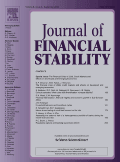
Journal of Financial Stability
Empowering insights into contemporary financial challenges.The Journal of Financial Stability, published by Elsevier Science Inc., is a renowned academic journal that serves as a premier platform for the dissemination of innovative research in the fields of finance, economics, and econometrics. With an ISSN of 1572-3089 and an E-ISSN of 1878-0962, this journal has established itself as a leader in its category, ranking Q1 for both Economics and Finance in the 2023 category quartiles. This positions it amongst the top 13% of journals in Economics and the top 35% in Finance, according to Scopus rankings. Covering a wide range of topics related to financial stability, the journal aims to fulfill its objective of advancing scholarly communication and providing researchers, professionals, and students with valuable insights into contemporary financial challenges and innovations. Operating from the Netherlands and converging from 2004 to 2024, the Journal of Financial Stability continues to contribute significantly to the academic landscape, inviting submissions that push the boundaries of knowledge and understanding in financial systems.
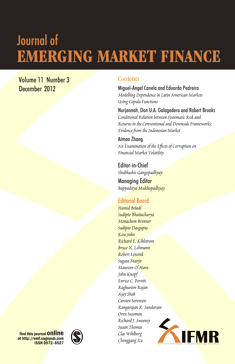
Journal of Emerging Market Finance
Navigating the Complexities of Financial SystemsThe Journal of Emerging Market Finance, published by SAGE Publications India Pvt Ltd, is a premier academic journal that serves as a vital resource for researchers, professionals, and students in the fields of finance and economics. Established in 2002, this journal focuses on the multifaceted dynamics of emerging market economies and their financial systems. With an ISSN of 0972-6527 and an E-ISSN of 0973-0710, it has garnered attention with its respectable Q3 rankings in both the Economics and Econometrics and Finance categories, reflecting its commitment to high-quality research. Despite its limited open-access options, the journal remains a significant platform for scholarly discussions, providing insights on emerging financial instruments, market behaviors, and economic policies in developing economies. As a continuously evolving publication, it aims to bridge the gap between theory and practice, promoting an understanding of the complexities faced in these vibrant markets, ultimately serving the academic community with relevant and impactful research until 2024 and beyond.

International Journal of Financial Studies
Connecting scholars and practitioners in finance.The International Journal of Financial Studies is a premier publication dedicated to advancing the field of finance through open-access research. Published by MDPI based in Switzerland, this journal offers researchers, professionals, and students a platform to disseminate their findings in an accessible format since its establishment in 2013. With its ISSN of 2227-7072 and a commendable impact reflected in its Q2 ranking in finance, it occupies an influential position among finance-related journals, as evidenced by its 65th percentile rank in Scopus. The journal encompasses a wide array of topics in finance, making it essential reading for those seeking to stay abreast of current research trends and methodologies. As an open-access journal, all articles are freely available, significantly enhancing the visibility and reach of published studies, which is crucial for fostering collaboration and innovation within the global financial community. Published continuously until 2024, the International Journal of Financial Studies is not just a source of knowledge; it is a critical contributor to the progression of financial scholarship.
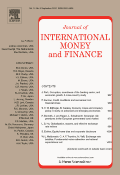
JOURNAL OF INTERNATIONAL MONEY AND FINANCE
Navigating the complexities of international monetary dynamics.JOURNAL OF INTERNATIONAL MONEY AND FINANCE is a premier scholarly publication dedicated to advancing the understanding of international finance and monetary economics. Published by Elsevier Science Ltd, this esteemed journal has been disseminating critical research since its inception in 1982 and will continue to contribute to the field through 2024. With a strong international presence and headquarters in the United Kingdom, the journal boasts an impressive collection of articles that explore significant trends, challenges, and innovations in the areas of economics and finance. Recognized for its impact, it ranks in the top quartile (Q1) in both the Economics and Econometrics and Finance categories as of 2023, signifying its influence and relevance among peers. Researchers, professionals, and students in these disciplines can benefit from the journal's rigorous peer-review process, ensuring high-quality scholarly outputs. Though not currently an open-access journal, it provides various subscription options to foster access to groundbreaking research in the financial ecosystem.
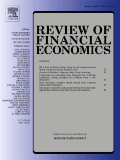
Review of Financial Economics
Illuminating the Intersection of Economics and FinanceReview of Financial Economics, published by WILEY, stands as a prominent peer-reviewed journal in the fields of economics and finance. Established in 1994, this journal provides a platform for rigorous research and thoughtful discourse, contributing to the advancement of knowledge in financial theory and its applications. With an HIndex indicative of its citation impact, it ranks in the Q3 quartile for both Economics and Econometrics, as well as Finance, based on the 2023 categorization, underscoring its role in the academic community. Although it does not currently offer Open Access, the journal remains accessible to a wide audience through institutional subscriptions. Researchers, professionals, and students are encouraged to engage with its insightful articles that address contemporary issues and advancements within financial economics, fostering a deeper understanding of the complex interplay between economic systems and financial markets.

International Review of Finance
Fostering impactful research for a dynamic financial landscape.International Review of Finance is a prestigious academic journal published by Wiley, located in the United Kingdom. With its ISSN 1369-412X and E-ISSN 1468-2443, this journal serves as an essential platform for researchers and practitioners in the fields of Economics and Finance. Ranked in the Q2 quartile for both Economics and Econometrics and Finance as of 2023, it showcases high-quality research that contributes significantly to theoretical and practical advancements. Reflecting its standing, the journal is positioned in the 61st percentile in Economics and Econometrics and the 60th percentile in Finance according to Scopus rankings. The scope of the journal includes a diverse range of topics, encouraging innovative discourse across various financial disciplines. Although it does not offer open access, the International Review of Finance continues to be an important resource for academics, professionals, and students seeking to deepen their understanding of evolving financial theories and practices.
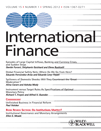
International Finance
Elevating scholarly discourse in international finance.International Finance is a prestigious academic journal published by WILEY, dedicated to the exploration and advancement of theories and practices in the realms of finance, development, and geography. With a strong emphasis on empirical and theoretical research, this journal provides a crucial platform for researchers, professionals, and students to disseminate cutting-edge findings that shape our understanding of the financial landscape on a global scale. Holding an impressive impact factor and categorized in the Q2 quartile across multiple disciplines, including Development, Finance, and Geography, the journal has established itself as a significant contributor to scholarly discourse. Since its inception in 1998 and spanning until 2024, International Finance offers a comprehensive overview of current trends and challenges faced in financial contexts, enhancing the decision-making processes within academia and industry alike. Although the journal is not open access, its rigorous peer-review process guarantees high-quality content that is indispensable for anyone engaged in the diverse fields intersecting with finance.

FEDERAL RESERVE BANK OF ST LOUIS REVIEW
Empowering researchers with cutting-edge economic analyses.The Federal Reserve Bank of St. Louis Review is a prestigious academic journal published by the Federal Reserve Bank of St. Louis, dedicated to disseminating high-quality research in the field of economics and finance. As a respected publication, it holds a significant position in its domain, as evidenced by its placement in the Q2 quartile in the Business and International Management category and ranking 210 out of 443 in Scopus. The journal offers an insightful platform for researchers, professionals, and students alike to engage with cutting-edge analyses and discussions, emphasizing topics relevant to monetary policy, economic trends, and financial stability. Although it operates without an Open Access model, its articles are instrumental for those looking to deepen their understanding of economic dynamics and policy implications in today’s global marketplace. With a commitment to fostering scholarly exchange, the Federal Reserve Bank of St. Louis Review remains a vital resource for advancing knowledge and practical solutions in economics and finance.